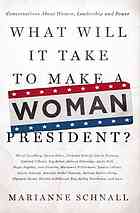
What Will It Take to Make a Woman President?
Conversations About Women, Leadership and Power
- اطلاعات
- نقد و بررسی
- دیدگاه کاربران
نقد و بررسی

September 30, 2013
Schnall (Daring to Be Ourselves), founder and executive director of Feminist.com, poses the title question to 29 diverse contributors including sociologist Michael Kimmel, journalist Soledad O’Brien, songwriter Melissa Etheridge, lawyer Anita Hill, and spiritual teacher Marianne Williamson. The inclusion of seven elected officials, six congresswomen, and one governor provides instructive insight into just what it takes to succeed. Not surprisingly, former secretary of state Hilary Clinton and President Barack Obama are referenced widely, as are Sheryl Sandberg’s 2013 bestseller Lean In and Jennifer Siebel Newson’s 2011 award-winning documentary Miss Representation; both Sandberg and Newson are interviewed as well. The format is conversational, with Schnall as engaged as her subjects. Answers to the governing question vary. Some look inward: “When it comes to politics, women have an internal glass ceiling.” Most take a critical look at the roles of media and money (for example, the expense of campaigning). Read in one gulp, the book feels repetitive, but that’s appropriate given Schnall’s mission of “encouraging women and girls as leaders and change agents in their lives, their communities, and the larger world.” Agent: Tracy Brown, Tracy Brown Literary Agency.

October 1, 2013
Intriguing interviews exploring the role of women in American political leadership. "When so many other nations have women presidents, why doesn't the United States?" Feminist.com founder Schnall (Daring to Be Ourselves: Influential Women Share Insights on Courage, Happiness, and Finding Your Own Voice, 2010) is a sensitive, perceptive interviewer who leads each of the more than two dozen conversations that she transcribes in this book with some variation on its titular question. The answers to this initial query tend to hit on a few unsurprising explanations: systemic sexism, the burdens of raising families that still tend to fall on women, and a lack of willingness of women to step forward and run for political office. The author effectively leads her interlocutors (mostly, but not all, women and mostly, but not all, liberal) through wide-ranging conversations that use the initial question as a springboard to more substantial discussions about women in politics, women's leadership more broadly and the changing state of American gender relationships. This makes the book worthwhile since the initial question is not especially interesting, or at least not as interesting as the larger context within which women politicians, business leaders and others operate. The book touts that Schnall's conversations are with "thought leaders," a label that may be generous to at least a few of them, but she does draw on an impressive array of politicians, business figures, entertainers and others to provide a snapshot of the roles of American women in the corridors of power. Of the many contributors, some of the more well-known include Maya Angelou, Olympia Snowe, Nancy Pelosi, Gloria Steinem, Anita Hill and Nicholas Kristof. Barack Obama smashed down one long-closed door in 2008. This book makes a compelling case for another shattering of barriers sooner rather than later.
COPYRIGHT(2013) Kirkus Reviews, ALL RIGHTS RESERVED.

October 15, 2013
Schnall, a journalist who runs the website Feminist.com, has asked 30 successful and well-known women--e.g., Gloria Steinem, Maya Angelou, Anita Hill, Nancy Pelosi--and a few feminist men why we have not had a woman president. Their answers are alike: the responsibility of women for family care, the expectation that leaders will be men, the failure to recruit women for political or leadership positions, women's lesser access to money, and the stereotyped presentation of women in various media. Their proposals to get more women to run for public office or to climb the corporate ladder are similar: women must demand more access, overcome self-doubt, put themselves forward, and shame leaders into supporting greater diversity. We need women in office because, the respondents say, women bring a different perspective, they encourage consensus and collaboration, and they pay more attention to building relationships. But some of the interviewees caution that voters must cast their ballots based on issues, not gender. As Jane Fonda puts it in the book, "It's less about gender sometimes and more about consciousness." VERDICT This title will best appeal to the uninitiated but curious.--Cynthia Harrison, George Washington Univ., Washington, DC
Copyright 2013 Library Journal, LLC Used with permission.

October 15, 2013
It is, arguably, the most pertinent question in modern political history: When will there be a woman president? When posed by Schnall's young daughter, the topic took on a whole new sense of urgency. To find the answer, the author and founder of Feminist.com interviewed a dazzling and diverse array of distinguished politicians, journalists, corporate executives, writers, and entertainers. Everyone from Gloria Steinem to Nancy Pelosi, Donna Brazile to Marianne Williamson, Nicholas Kristof to Michael Kimmel, Anita Hill to Kirsten Gillibrand. Through far-ranging conversations, Schnall gained insight into factors contributing to the country's failure to elect a woman to its highest office and sought advice as to how we can not only better prepare for the next presidential election but create a world in which today's young women feel empowered to break out of stereotypical roles. The good news is that there is universal agreement among those profiled that the country will, indeed, elect a woman president. The more disconcerting message is that there is still much work to do in order to achieve true gender parity.(Reprinted with permission of Booklist, copyright 2013, American Library Association.)




دیدگاه کاربران